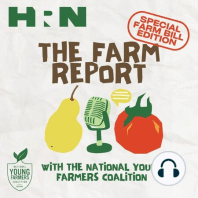41 min listen
Episode 195: David Pietsch
FromThe Farm Report
ratings:
Length:
30 minutes
Released:
Jan 30, 2014
Format:
Podcast episode
Description
Erin Fairbanks digs into the lamb business with David Piestch of the Australian Lamb Council on this weeks edition of The Farm Report. Tune into this episode to hear why Australians eat twenty times more lamb than people in the United States, and the roots of the industry in wool. Find out what types of Australian lamb carcasses are shipped to the United States based on the cuts that Americans prefer. Why are most Australian lambs raised on pasture? Does Australian lamb importation affect the bottom line of local producers in the States? Tune in to this episode for more on global trade, and how larger scale production can ensure a certain consistency of product. Thanks to our sponsor, White Oak Pastures. Music provided by Idgy Dean. We eat about twenty times the amount of lamb in Australia than you do in the United States. [3:30] While people love producing lamb, its not the most profitable thing in the world, especially with seasonal conditions... But our farmers are proud to produce pasture-raised lamb and ship it all over the world. [7:00] -- David Piestch on The Farm Report
Released:
Jan 30, 2014
Format:
Podcast episode
Titles in the series (100)
Episode 6: Eric Rapp & Charlotte Swancy: Heritage talks with Eric Rapp of the Rare Hare Barn in Leonn, Kansas. Eric raises rare breed Heritage Rabbits. The second guest is Charlotte Swancy, a young Heritage Berkshire pig farmer of Riverview Farms in Georgia. by The Farm Report
